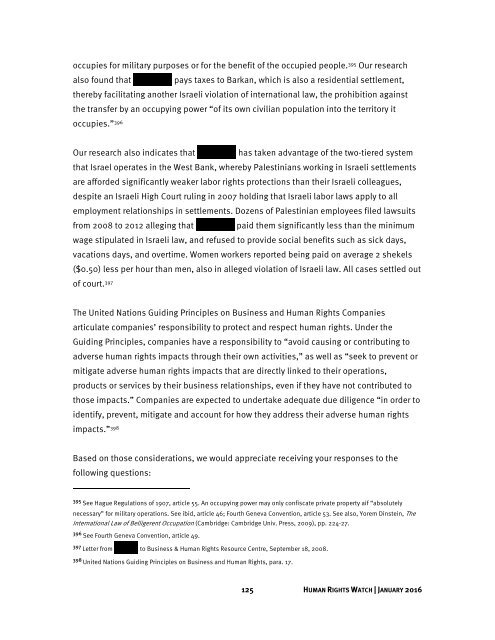OCCUPATION INC
israel0116_web
israel0116_web
Create successful ePaper yourself
Turn your PDF publications into a flip-book with our unique Google optimized e-Paper software.
occupies for military purposes or for the benefit of the occupied people. 395 Our research<br />
also found that XXXXXXXX pays taxes to Barkan, which is also a residential settlement,<br />
thereby facilitating another Israeli violation of international law, the prohibition against<br />
the transfer by an occupying power “of its own civilian population into the territory it<br />
occupies.” 396<br />
Our research also indicates that XXXXXXXX has taken advantage of the two-tiered system<br />
that Israel operates in the West Bank, whereby Palestinians working in Israeli settlements<br />
are afforded significantly weaker labor rights protections than their Israeli colleagues,<br />
despite an Israeli High Court ruling in 2007 holding that Israeli labor laws apply to all<br />
employment relationships in settlements. Dozens of Palestinian employees filed lawsuits<br />
from 2008 to 2012 alleging that XXXXXXXX paid them significantly less than the minimum<br />
wage stipulated in Israeli law, and refused to provide social benefits such as sick days,<br />
vacations days, and overtime. Women workers reported being paid on average 2 shekels<br />
($0.50) less per hour than men, also in alleged violation of Israeli law. All cases settled out<br />
of court. 397<br />
The United Nations Guiding Principles on Business and Human Rights Companies<br />
articulate companies’ responsibility to protect and respect human rights. Under the<br />
Guiding Principles, companies have a responsibility to “avoid causing or contributing to<br />
adverse human rights impacts through their own activities,” as well as “seek to prevent or<br />
mitigate adverse human rights impacts that are directly linked to their operations,<br />
products or services by their business relationships, even if they have not contributed to<br />
those impacts.” Companies are expected to undertake adequate due diligence “in order to<br />
identify, prevent, mitigate and account for how they address their adverse human rights<br />
impacts.” 398<br />
Based on those considerations, we would appreciate receiving your responses to the<br />
following questions:<br />
395 See Hague Regulations of 1907, article 55. An occupying power may only confiscate private property aif “absolutely<br />
necessary” for military operations. See ibid, article 46; Fourth Geneva Convention, article 53. See also, Yorem Dinstein, The<br />
International Law of Belligerent Occupation (Cambridge: Cambridge Univ. Press, 2009), pp. 224-27.<br />
396 See Fourth Geneva Convention, article 49.<br />
397 Letter from xxxxxxxx to Business & Human Rights Resource Centre, September 18, 2008.<br />
398 United Nations Guiding Principles on Business and Human Rights, para. 17.<br />
125 HUMAN RIGHTS WATCH | JANUARY 2016


